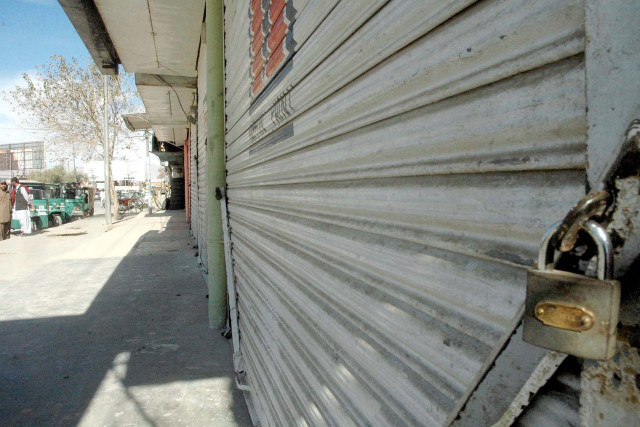Economy left to rust as political parties protest ‘injustices’
Absence of public transport makes it impossible for daily wage earners to report to work.

Absence of public transport makes it impossible for daily wage earners to report to work. PHOTO: PPI/ FILE
Wednesday’s strike call was given by Ahle Sunnat Wal Jamaat (ASWJ), formerly the banned Sipah-e-Sahaba Pakistan, after the motorcade of its Karachi chief, Maulana Aurangzeb Farooqui, was ambushed near Moti Mahal on Tuesday. Four policemen, a guard and the driver of Farooqui were shot dead in that attack. The assassination bid triggered further violence and at least seven more people were gunned down later in the day.
Most wholesale markets in the Old city areas remained closed, while most petrol pumps and CNG stations stayed offline. Besides the Old City areas, Orangi Town, Patel Para, Lasbella, Nagan Chowrangi, Surjani Town, New Karachi, North Karachi, Nazimabad, Gulshan-e-Hadeed, Keamari, Gulshan-e-Iqbal, Sultanabad, Shershah, Korangi, Gulistan-e-Jauhar and Banaras were the worst-affected areas where armed men on motorcycles took to the roads and forced shopkeepers to pull down their shutters.
Earlier on December 15, an “unannounced strike,” was observed a day after Muttahida Qaumi Movement chief Altaf Hussain was served contempt notices by the apex court.
According to All Karachi Tajir Ittehad (AKTI) chairperson Atiq Mir, nearly three million daily wage earners in the city are adversely affected by market shutdowns. He estimated that the traders’ lose nearly Rs3 billion every time such a widespread closure takes place. During the last 10 days, we had six holidays and one strike. No trading activities took place on those days, said the AKTI chief.

Fazal Rabi, 35, a labourer who supplies cloth from warehouses to shops in Bolton Market on a wooden cart, said that he earns around Rs500 every day. He is the sole breadwinner for his family of five. “Our food comes from what I earn every day. We suffer whenever the market is closed, either due to a strike or a holiday. I have to borrow money from others to buy food for my family,” he said.
All Pakistan Organisation of Small Traders and Cottage Industries (APOSTCI) Karachi president Mehmood Hamid said that a majority of daily wage workers, who earn anywhere between Rs200 to Rs800 a day, work in industries that are located on the outskirts of the city. During such closures, commuting is very hard for them.
Public transport off the roads
Labourers, such as Rabi, suffer mainly because public transporters do not take out their vehicles on the streets.
“Workers fail to reach their workplaces in Landhi, Korangi, SITE and other areas, as public transport disappears from the roads whenever a strike call is given,” explained Hamid. He added that the cumulative losses for industries in the city can be Rs7 billion a day.
For their part, Karachi Transport Ittehad (KTI) chairperson Irshad Bukhari explained that, “We are scared of the riots, after three of our vehicles were torched on Tuesday in the violence that broke out after the attack on Maulana Aurangzeb Farooqui”.
Bukhari clarified that the transporters were not supporting ASWJ’s strike call. “We condemn the attack on Maulana Farooqui, but we do not support strikes because they cause losses for our businesses.” More than 500 of our vehicles have been torched in the past five years, but the government has compensated us for only 100 vehicles, he complained.
Published in The Express Tribune, December 28th, 2012.



















COMMENTS
Comments are moderated and generally will be posted if they are on-topic and not abusive.
For more information, please see our Comments FAQ